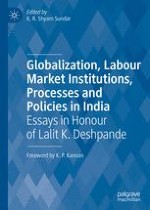2019 | OriginalPaper | Buchkapitel
6. Emerging Vulnerabilities in India’s Plantation Economy
verfasst von : M. Vijayabaskar, P. K. Viswanathan
Erschienen in: Globalization, Labour Market Institutions, Processes and Policies in India
Verlag: Springer Nature Singapore
Aktivieren Sie unsere intelligente Suche, um passende Fachinhalte oder Patente zu finden.
Wählen Sie Textabschnitte aus um mit Künstlicher Intelligenz passenden Patente zu finden. powered by
Markieren Sie Textabschnitte, um KI-gestützt weitere passende Inhalte zu finden. powered by
